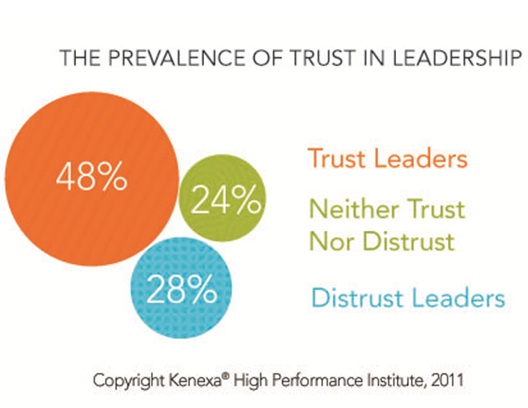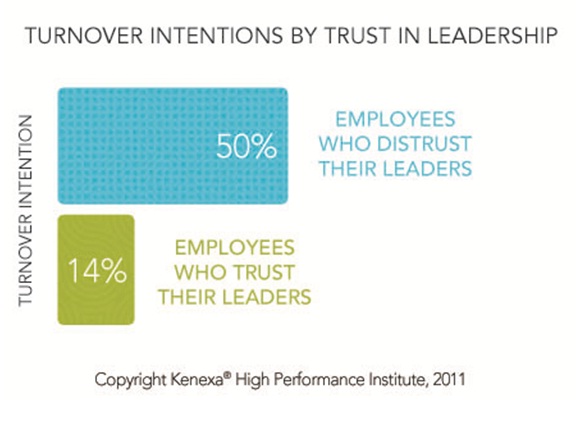Research shows that one in four employees don’t trust the senior leaders in their organisation. Dr Rena Rasch reveals the truth about trust and what leaders can do to improve it.
Do your employees trust you? Perhaps you’ve never even been asked this question. However, it cuts to the heart of your working relationships and even the performance of your organisation. Trust is an issue that you can’t afford to ignore.
Research [1] shows that 28% of employees don’t trust the senior leaders in their organisation. That’s more than one in four workers. What’s more, this lack of trust in leaders has a strikingly negative impact on staff retention, employee wellbeing and organisational performance.
It seems that employees who distrust their leaders are nine times more likely to seriously consider leaving their organisation. They’re also 15 times more likely to report unreasonable work stress and seven times more likely to feel mentally and physically unwell.
What is trust?
Simply put, trust requires a person to have reliance and confidence in the actions of another, with no guarantee that he/she will behave as desired in return. When applied to leadership, trust is an employee’s willingness to take a risk for a leader with the expectation that in exchange, the leader will behave in some desired way. For example, an employee may risk remaining at an organisation during lean times with the expectation that the leader will pull the organisation out of the slump. That choice requires trust in leadership.
In 2011, just under half (48%) of all employees in our research trusted their leaders, 28% actively distrusted their leaders and 24% were undecided.

Employees who trust leaders want to stay
Research also indicated that trust in leadership is important in retaining employees – employees who trust their leaders want to stay with their organisation, while those who distrust their leaders are about nine times more likely to seriously consider leaving their organisation.
Specifically, this research shows that about half of all employees who distrust their senior leaders are seriously considering leaving their organisation. Of those who do trust their leaders, only 14% are seriously considering leaving.

What drives trust?
Research went beyond simply asking employees whether they trust their leaders. We also looked for an insight into the fundamental elements of what makes people trust one another. Trust is not an absolute quality. Rather, we trust others a little, a lot, completely, not at all or any number of variations in between. According to organisational scientists, what makes us trust or distrust people is largely a combination of three core determinants:
- Competence (can they do the job?)
- Benevolence (do they care about me?)
- Integrity (are they honest?)
These three determinants together account for about 80% of what make employees' trust their leaders.
To maximise the trust they receive from their employees, leaders should demonstrate all three qualities. However, some of these qualities are more important than others to employees’ trust in leadership (see beneath). Integrity is the most important at 41%, followed by benevolence at 34%, then competence at 25%. When the goal is to maximise trust, leaders must know how to do their jobs well, but it is even more important for them to be considerate, supportive and honest with their employees.

How to gain the trust of employees
Essentially, you can gain the trust of employees by demonstrating these three qualities (competence, benevolence and integrity). However, you not only have to be honest, benevolent and competent – you also have to be seen to be so.
On an individual level, one of the easiest ways to cultivate employee trust is to show trust in the people around you. Listen to them; empathise with them; show your concern; be honest with them; be true to your word; treat them fairly. In other words, actively manage how you are perceived by others. Try to connect with people on a personal level. This could be as simple as shaking hands with them once in a while.
There are also steps that an organisation can take to engender trust. In fact, our research highlights clear links between professional human capital management (HCM) best practices and trust in leadership. In our research, 78% of employees report they work for an organisation with a published mission statement, 61% work for a company that regularly surveys its employees and 72% received a performance review in the last 12 months. These HCM practices are typical of more progressive organisations. They are also linked to levels of trust in leadership. In fact, employees are twice as likely to trust their senior leaders if the organisation has engaged in these progressive HCM practices. Not only that, but the more of these best practices that the organisation engages in, the greater the level of employee trust in leadership.
Finally, knowing which employees are generally less trusting can help your organisation to target interventions. When analysing whether certain groups of employees tend to trust their leaders more or less than others, our research found no significant difference between men and women. However, we found that the percentage of people who trust their leaders does seem to decline with age. Employees in their 20s are twice as likely to trust their leaders as employees in their 40s or 50s. Furthermore, there are clear differences in trust at different levels in an organisation; upper and mid-level managers trust their leaders by 15 percentage points more than rank-and-file employees.
Trust is an essential quality in today’s organisations. The simple steps of acting as a trustworthy role model and advocating a business case for trust could help to improve staff retention, employee well-being and the performance of your organisation.
Dr Rena Rasch is research manager at Kenexa
[1] Trust Matters is a report on a study of 10,000 employees, undertaken by the High Performance Institute by Kenexa, an IBM company. The report can be downloaded free here
Research shows that one in four employees don’t trust the senior leaders in their organisation. Dr Rena Rasch reveals the truth about trust and what leaders can do to improve it.
Do your employees trust you? Perhaps you’ve never even been asked this question. However, it cuts to the heart of your working relationships and even the performance of your organisation. Trust is an issue that you can’t afford to ignore.
Research [1] shows that 28% of employees don’t trust the senior leaders in their organisation. That’s more than one in four workers. What’s more, this lack of trust in leaders has a strikingly negative impact on staff retention, employee wellbeing and organisational performance.
It seems that employees who distrust their leaders are nine times more likely to seriously consider leaving their organisation. They’re also 15 times more likely to report unreasonable work stress and seven times more likely to feel mentally and physically unwell.
What is trust?
Simply put, trust requires a person to have reliance and confidence in the actions of another, with no guarantee that he/she will behave as desired in return. When applied to leadership, trust is an employee’s willingness to take a risk for a leader with the expectation that in exchange, the leader will behave in some desired way. For example, an employee may risk remaining at an organisation during lean times with the expectation that the leader will pull the organisation out of the slump. That choice requires trust in leadership.
In 2011, just under half (48%) of all employees in our research trusted their leaders, 28% actively distrusted their leaders and 24% were undecided.

Employees who trust leaders want to stay
Research also indicated that trust in leadership is important in retaining employees - employees who trust their leaders want to stay with their organisation, while those who distrust their leaders are about nine times more likely to seriously consider leaving their organisation.
Specifically, this research shows that about half of all employees who distrust their senior leaders are seriously considering leaving their organisation. Of those who do trust their leaders, only 14% are seriously considering leaving.

What drives trust?
Research went beyond simply asking employees whether they trust their leaders. We also looked for an insight into the fundamental elements of what makes people trust one another. Trust is not an absolute quality. Rather, we trust others a little, a lot, completely, not at all or any number of variations in between. According to organisational scientists, what makes us trust or distrust people is largely a combination of three core determinants:
- Competence (can they do the job?)
- Benevolence (do they care about me?)
- Integrity (are they honest?)
These three determinants together account for about 80% of what make employees' trust their leaders.
To maximise the trust they receive from their employees, leaders should demonstrate all three qualities. However, some of these qualities are more important than others to employees’ trust in leadership (see beneath). Integrity is the most important at 41%, followed by benevolence at 34%, then competence at 25%. When the goal is to maximise trust, leaders must know how to do their jobs well, but it is even more important for them to be considerate, supportive and honest with their employees.

How to gain the trust of employees
Essentially, you can gain the trust of employees by demonstrating these three qualities (competence, benevolence and integrity). However, you not only have to be honest, benevolent and competent - you also have to be seen to be so.
On an individual level, one of the easiest ways to cultivate employee trust is to show trust in the people around you. Listen to them; empathise with them; show your concern; be honest with them; be true to your word; treat them fairly. In other words, actively manage how you are perceived by others. Try to connect with people on a personal level. This could be as simple as shaking hands with them once in a while.
There are also steps that an organisation can take to engender trust. In fact, our research highlights clear links between professional human capital management (HCM) best practices and trust in leadership. In our research, 78% of employees report they work for an organisation with a published mission statement, 61% work for a company that regularly surveys its employees and 72% received a performance review in the last 12 months. These HCM practices are typical of more progressive organisations. They are also linked to levels of trust in leadership. In fact, employees are twice as likely to trust their senior leaders if the organisation has engaged in these progressive HCM practices. Not only that, but the more of these best practices that the organisation engages in, the greater the level of employee trust in leadership.
Finally, knowing which employees are generally less trusting can help your organisation to target interventions. When analysing whether certain groups of employees tend to trust their leaders more or less than others, our research found no significant difference between men and women. However, we found that the percentage of people who trust their leaders does seem to decline with age. Employees in their 20s are twice as likely to trust their leaders as employees in their 40s or 50s. Furthermore, there are clear differences in trust at different levels in an organisation; upper and mid-level managers trust their leaders by 15 percentage points more than rank-and-file employees.
Trust is an essential quality in today’s organisations. The simple steps of acting as a trustworthy role model and advocating a business case for trust could help to improve staff retention, employee well-being and the performance of your organisation.
Dr Rena Rasch is research manager at Kenexa
[1] Trust Matters is a report on a study of 10,000 employees, undertaken by the High Performance Institute by Kenexa, an IBM company. The report can be downloaded free here







